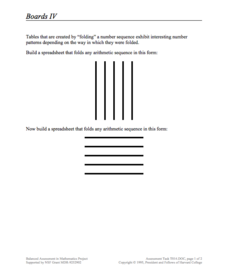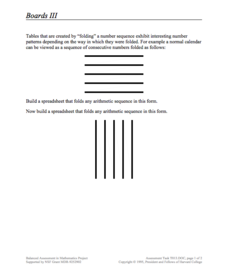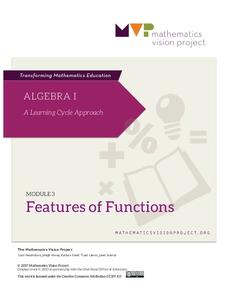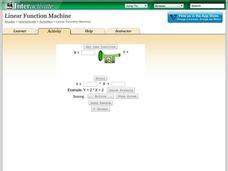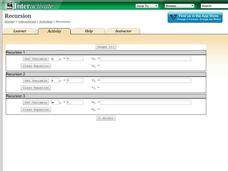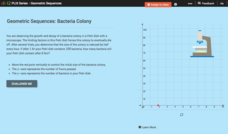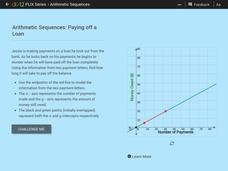Curated OER
Series Review Sheet
Save an infinite amount of time and enjoy this pre-made series formula guide. Arithmetic and geometric formulas are all included as well as Pascal's Triangle and examples of how the Binomial Theorem expands.
EngageNY
The Power of Exponential Growth
How do you make a penny grow to $5,000 in just 15 days? Use the examples in this lesson to explore the concept of exponential growth and its comparison to linear models. Pupils come to understand that exponential growth eventually...
EngageNY
Arithmetic and Geometric Sequences
Arithmetic and geometric sequences are linear and geometric patterns. Help pupils understand the relationship and see the connection with an activity that asks them to write the rules and classify the patterns correctly. A sorting...
Curated OER
Linear and Exponential Functions
This comprehensive unit on linear and exponential functions provides numerous clearly-written worksheets. Topics include graphing linear equations, solving systems of equations algebraically and by graphing, identifying the domain and...
K20 LEARN
Didn’t We Already Learn That Pattern? Functions/Arithmetic Sequences
Just how many toothpicks does the pattern take? After watching a video of someone building a pattern with toothpicks, groups create methods to find the number of toothpicks needed to accomplish that task. Groups either use explicit...
Radford University
Fibonacci is All Around
One ratio to rule them all. Young mathematicians investigate the Fibonacci sequence and the Golden Ratio. To begin the first lesson, they use a spreadsheet to see how the Fibonacci sequence gives the Golden Ratio. The second lesson...
Rice University
Intermediate Algebra
Algebra concepts are all wrapped up in one nice bow. The resource combines all the concepts typically found in Algebra I and Algebra II courses in one eBook. The topics covered begin with solving linear equations and move to linear...
Mathed Up!
Sequences
Explicitly talk to the class about sequences. A segment of a review series for the General Certificate of Secondary Education math assessment provides a review of arithmetic sequences. Pupils watch a video showing how to find terms given...
CCSS Math Activities
Smarter Balanced Sample Items: High School Math – Target K
Your target is an increased understanding of functions. A set of 10 questions in a PowerPoint presentation covers the high school SBAC Claim 1 Target K item specifications. Scholars show their knowledge of functions, function notation,...
Concord Consortium
Boards IV
Build a connection between algebraic sequences and spreadsheets. Learners examine a specific folding pattern and convert the pattern into a spreadsheet. The goal of the spreadsheet is to produce a sequence of a specific pattern modeled...
Concord Consortium
Boards III
Learn to visualize mathematical patterns as a folded pattern. Beginning with a visual display, the task encourages pupils to view sequences as a folded table. The pattern of the table then becomes a formula in a spreadsheet that...
Mathematics Vision Project
Module 3: Features of Functions
Learn how to represent functions in multiple ways. Learners analyze functions as equations, graphs, and verbal descriptions. The analysis includes intercepts, behavior, domain, and range. The module of seven lessons makes up the third...
Mathematics Vision Project
Module 2: Linear and Exponential Functions
Write, graph, and model all things linear and exponential. Building on the previous module in a nine-part Algebra I series, learners compare linear exponential modeling. They write equations, graph functions, and analyze key features.
Kenan Fellows
Dinner Party: Using Pattern Trains to Demonstrate Linear Functions
Nothing fancy here ... just your run-of-the-mill Algebra party! Learners explore the patterns of linear functions while designing seating arrangements for a dinner party. Comparing the number of tables to the perimeter of the combined...
Shodor Education Foundation
Multi-Function Data Flyer
Explore different types of functions using an interactive lesson. Learners enter functions and view the accompanying graphs. They can choose to show key features or adjust the scale of the graph.
Shodor Education Foundation
Linear Function Machine
What goes in must come out! Learners play with a function machine to determine the correct function. They enter input values and watch as the machine produces the output.
Shodor Education Foundation
Recursion
Perform the operation ... and then do it again. Scholars investigate recursive formulas by creating and graphing them. Using the interactive, pupils set the variable, determine the initial value, and type in a recursive formula.The...
CK-12 Foundation
Recursive Formulas: Fibonacci Sequence
Explore the building blocks of the Fibonacci Sequence. Given the lengths of sides of squares, pupils deduce the pattern to determine the lengths of two more squares. Learners continue to work with recursive formulas to generate numerical...
CK-12 Foundation
Geometric Sequences: Bacteria Colony
Show budding mathematicians how to model a diminishing bacteria colony two ways—graphically and algebraically. Using the coordinate axis, pupils create a graph to represent the decay of a bacteria colony. They determine the number of...
CK-12 Foundation
Sequence: The Sequence Calculator
Work through a sequence in discovering number patterns. Using the interactive, pupils explore arithmetic and geometric sequences by setting the initial value and the common difference or ratio. Learners distinguish between the two types...
CK-12 Foundation
Arithmetic Sequences: Paying of a Loan
How long does it take to pay off a loan? Pupils use a graph to model the sequence associated with paying off a loan. Using the graph, learners determine the initial value and the common difference of the arithmetic sequence. The learners...
CK-12 Foundation
Explicit Formulas: Tiles for Writing nth Term in a Sequence
Build an explicit formula using tiles. Pupils develop a tile representation of a term within a sequence given figures of previous terms. Using the diagrams, learners develop the explicit formula by recognizing the common difference and...
Mathematics Vision Project
Features of Functions
What are some basic features of functions? By looking at functions in graphs, tables, and equations, pupils compare them and find similarities and differences in general features. They use attributes such as intervals of...
Mathematics Vision Project
Linear and Exponential Functions
Provide a continuous progression to linear and exponential functions. Pupils continue to work with the discrete functions known as sequences to the broader linear and exponential functions. The second unit in a series of nine provides...











